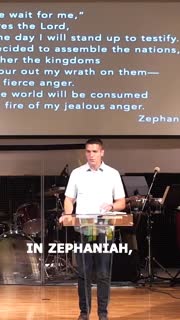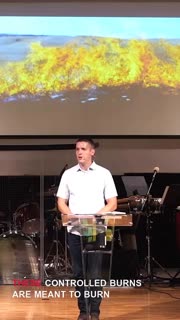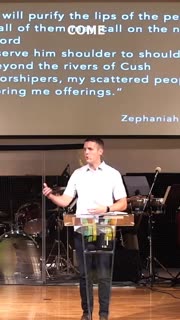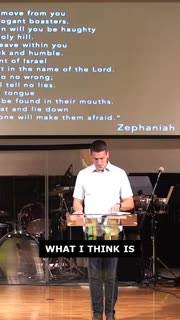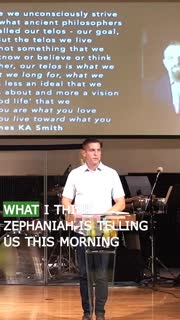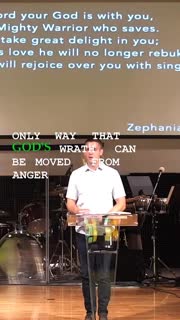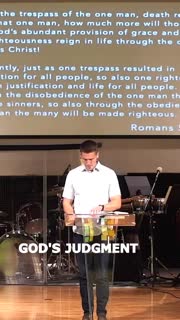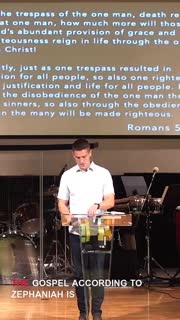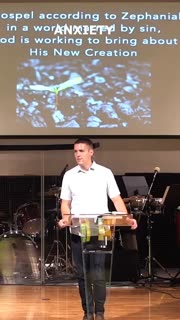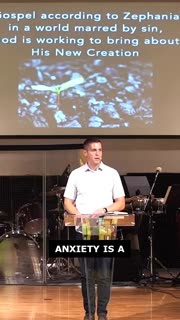God's Justice: Purification, Redemption, and Future Hope
Devotional
Sermon Summary
Bible Study Guide
Sermon Clips
1. "In Zephaniah, God's judgment is likened to a fire. A fire that is meant to not be annihilation, but a fire that is meant to be purification. A fire that is not meant to bring total destruction, but a fire that is meant to cleanse the world of all of its impurities, its evil, its sin, so that new life may emerge." [04:54] (30 seconds)
2. "These controlled burns are meant to burn away all of the weeds, all of the overgrowth and bring new and vibrant life through the ashes. This is what I believe Zephaniah is saying about God's judgment being like a fire. It burns. It burns toward those that are evil and unrighteous and sinful. It burns towards those who are oppressing those that we are called to care for." [06:23] (30 seconds)
3. "A great reversal will come from the curse of sin. A great reversal will happen that will reverse the curse of sin, that will undo the curse of sin. The lips of people will be purified. They will serve shoulder to shoulder as one, united as one people. Lips that are used to rebel and reject God will be used to praise him. The curse of sin will be undone. The relationship with God will be restored." [07:41] (32 seconds)
4. "What I think is being described here is how God's judgment will ultimately reveal what is in our hearts. God's judgment will ultimately reveal what is ruling our hearts, what we are aiming our lives after." [09:26] (16 seconds)
5. "What I think Zephaniah is telling us this morning is that God's judgment will ultimately reveal what is ruling our hearts, what it is that we truly desire. God's judgment will come toward those who are in our hearts. God's judgment will come toward those who are in our hearts. God's judgment will come toward those who are in our hearts. Whose hearts are ruled by pride and arrogance. Whose hearts are beefed up in haughtiness." [11:08] (23 seconds)
6. "The only way that God's wrath can be moved from anger to delight is if something has happened to cover the penalty of rebelling and rejecting God in sin. And we've seen it in the minor prophets. It's an endless loop. God forgives and the people continue to reject and rebel. God forgives and they continue to reject and rebel. So this remnant has to be something different. Has to be something more. Something more has to have happened." [14:43] (36 seconds)
7. "God's judgment is not about indiscriminate rage and anger toward us. We see this theme of God's judgment continually coming up in the minor prophets. And I think it's good that it continually comes up because every time we're forced to reckon with this thing that we don't like to talk about, which is that God has reigned. Which is that God is angry toward sin. But his wrath is not indiscriminate rage poured out on us. It is his justice toward what is evil and sinful." [19:16] (36 seconds)
8. "The gospel according to Zephaniah is that in a world, marred by sin, God is working to bring about his new creation. In a world marred by sin, God is working to bring about his new creation in Jesus Christ. The gospel according to Zephaniah is that in the anxious of days that we live in, God who is the ancient of days is working to fulfill his redemptive purposes. Working to make all things new, working to restore this world by his love and by his grace." [20:09] (39 seconds)
9. "If anxiety is seeing the future in light of a transmission struggle. Perhaps faith is seeing a present struggle in light of a future reality. If what we are doing in anxiety is getting stuck in the feedback loop and defining the future based on what we're struggling in the present, perhaps faith is informing that present struggle based on the hope of a future reality." [21:32] (33 seconds)
10. "Anxiety is a normal part of being human. It is our human response to a threat. It is our fight, flight, or freeze responses. The idea that we won't have anxiety is impossible. But the question for us is what do we do with our anxiety? Where do we go? To whom do we run? To what? Do we run? Things of this world that numb and push it away? Or a God who redefines our present reality in light of the future that is to come? In light of Christ who is making all things new?" [21:32] (46 seconds)
Ask a question about this sermon
2. "These controlled burns are meant to burn away all of the weeds, all of the overgrowth and bring new and vibrant life through the ashes. This is what I believe Zephaniah is saying about God's judgment being like a fire. It burns. It burns toward those that are evil and unrighteous and sinful. It burns towards those who are oppressing those that we are called to care for." [06:23] (30 seconds)
3. "A great reversal will come from the curse of sin. A great reversal will happen that will reverse the curse of sin, that will undo the curse of sin. The lips of people will be purified. They will serve shoulder to shoulder as one, united as one people. Lips that are used to rebel and reject God will be used to praise him. The curse of sin will be undone. The relationship with God will be restored." [07:41] (32 seconds)
4. "What I think is being described here is how God's judgment will ultimately reveal what is in our hearts. God's judgment will ultimately reveal what is ruling our hearts, what we are aiming our lives after." [09:26] (16 seconds)
5. "What I think Zephaniah is telling us this morning is that God's judgment will ultimately reveal what is ruling our hearts, what it is that we truly desire. God's judgment will come toward those who are in our hearts. God's judgment will come toward those who are in our hearts. God's judgment will come toward those who are in our hearts. Whose hearts are ruled by pride and arrogance. Whose hearts are beefed up in haughtiness." [11:08] (23 seconds)
6. "The only way that God's wrath can be moved from anger to delight is if something has happened to cover the penalty of rebelling and rejecting God in sin. And we've seen it in the minor prophets. It's an endless loop. God forgives and the people continue to reject and rebel. God forgives and they continue to reject and rebel. So this remnant has to be something different. Has to be something more. Something more has to have happened." [14:43] (36 seconds)
7. "God's judgment is not about indiscriminate rage and anger toward us. We see this theme of God's judgment continually coming up in the minor prophets. And I think it's good that it continually comes up because every time we're forced to reckon with this thing that we don't like to talk about, which is that God has reigned. Which is that God is angry toward sin. But his wrath is not indiscriminate rage poured out on us. It is his justice toward what is evil and sinful." [19:16] (36 seconds)
8. "The gospel according to Zephaniah is that in a world, marred by sin, God is working to bring about his new creation. In a world marred by sin, God is working to bring about his new creation in Jesus Christ. The gospel according to Zephaniah is that in the anxious of days that we live in, God who is the ancient of days is working to fulfill his redemptive purposes. Working to make all things new, working to restore this world by his love and by his grace." [20:09] (39 seconds)
9. "If anxiety is seeing the future in light of a transmission struggle. Perhaps faith is seeing a present struggle in light of a future reality. If what we are doing in anxiety is getting stuck in the feedback loop and defining the future based on what we're struggling in the present, perhaps faith is informing that present struggle based on the hope of a future reality." [21:32] (33 seconds)
10. "Anxiety is a normal part of being human. It is our human response to a threat. It is our fight, flight, or freeze responses. The idea that we won't have anxiety is impossible. But the question for us is what do we do with our anxiety? Where do we go? To whom do we run? To what? Do we run? Things of this world that numb and push it away? Or a God who redefines our present reality in light of the future that is to come? In light of Christ who is making all things new?" [21:32] (46 seconds)
